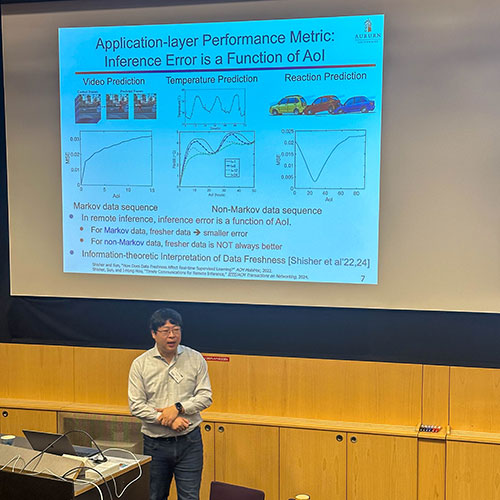Associate professor in ECE shares thoughts on data significance as conference keynote speaker
Published: Jun 5, 2025 7:00 AM
By Joe McAdory
Communication networks should prioritize data significance over data quantity and freshness. That’s the message Yin Sun, the Godbold Associate Professor in the Department of Electrical and Computer Engineering, shared as keynote speaker May 28 at the International Symposium on Modeling and Optimization in Mobile, Ad Hoc and Wireless Networks (WiOpt) at Linköping University in Sweden.
Traditionally, communication networks are designed to deliver data uniformly, without distinguishing between information of differing importance. Sun, whose presentation was titled “Goal-Oriented Communications: A Data Significance Perspective,” believes this model is obsolete in today’s complex, real-time environments.

“Think about a disaster response scenario. Some sensors may detect critical information — like a gas leak or structural instability — while others may simply be reporting temperature or humidity,” said Sun, a National Science Foundation CAREER Award recipient in 2023. “Treating all that data the same way clogs the network and delays crucial action. We need a system that knows what's urgent and acts on it. When we have so much data, the question isn’t just how to send it all — it’s how to send what really matters.”
Sun, who will serve as the conference’s general co-chair next year, introduced a framework for quantifying data significance using information-theoretic metrics. This framework enables systems to assign value to data based not just on age, but on how it supports specific goals or safety outcomes. It also expands on the concept of age of information by embedding context and consequence into data evaluation.
Sun said the impact of this research can be transformational for robotic systems and real-time artificial intelligence (AI).
“Imagine autonomous delivery robots navigating a college campus or a network of self-driving cars reacting to pedestrian movement,” he said. “These systems must decide — in real time — which data to prioritize. A robot or AI system doesn't just need data. It needs the right data to make safe, smart decisions.”
Sun’s ideas are also attracting attention from industry players, particularly those managing massive networks of sensors and control systems.
“We’ve been talking with companies that use thousands of sensors monitoring critical infrastructure,” he said. “Prioritizing significant data could vastly improve their efficiency and response times.”
Sun emphasized that this approach could form a cornerstone of emerging 6G communication technologies.
“We’re moving from a data-centric world to a purpose-driven one,” he said. “6G will not just be about speed. It’ll be about intelligence — networks that understand what matters and will adapt accordingly.”
Media Contact: , jem0040@auburn.edu, 334.844.3447
Yin Sun said the impact of his research can be transformational for robotic systems and real-time artificial intelligence.


